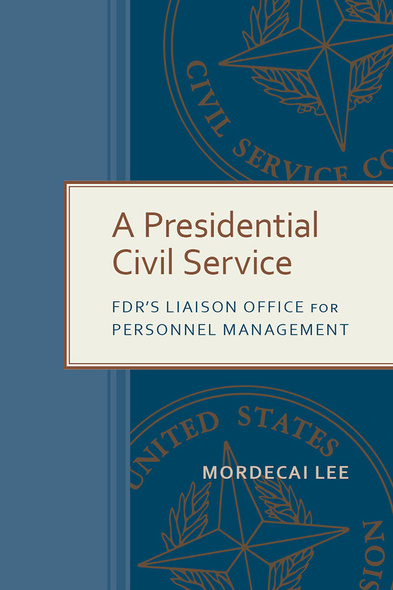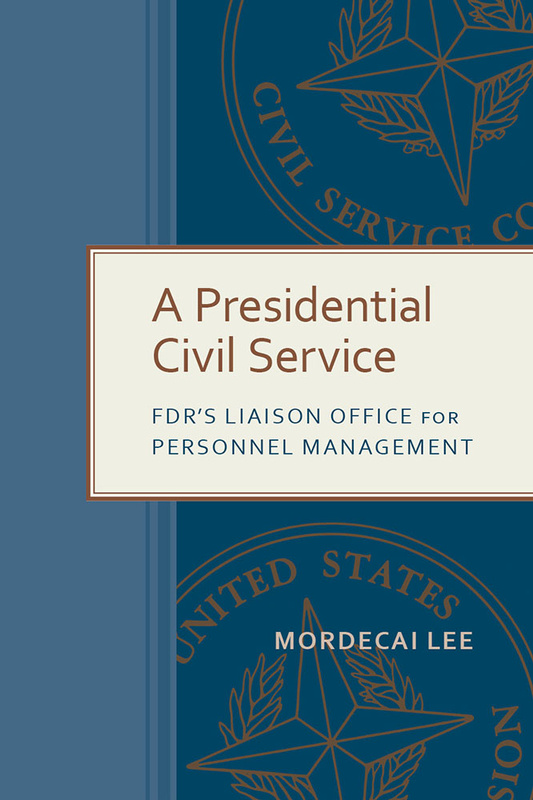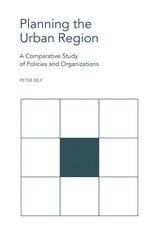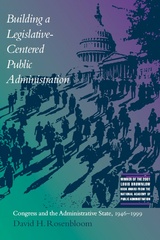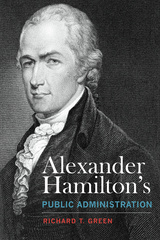A Presidential Civil Service
FDR's Liaison Office for Personnel Management
By Mordecai Lee
University of Alabama Press
A masterful account of the founding of President Franklin D. Roosevelt’s Liaison Office for Personnel Management (LOPM), and his use of LOPM to demonstrate the efficacy of a management-oriented federal civil service over a purely merit-based Civil Service Commission
A Presidential Civil Service offers a comprehensive and definitive study of President Franklin Delano Roosevelt’s Liaison Office for Personnel Management (LOPM). Established in 1939 following the release of Roosevelt’s Brownlow Committee report, LOPM became a key milestone in the evolution of the contemporary executive-focused civil service.
The Progressive Movement of the nineteenth and early twentieth centuries comprised groups across the political spectrum with quite different. All, however, agreed on the need for a politically autonomous and independent federal Civil Service Commission (CSC) to eliminate patronage and political favoritism. In A Presidential Civil Service, public administration scholar Mordecai Lee explores two models open to later reformers: continuing a merit-based system isolated from politics or a management-based system subordinated to the executive and grounded in the growing field of managerial science.
Roosevelt’s 1937 Brownlow Committee, formally known as the President’s Committee on Administrative Management, has been widely studied including its recommendation to disband the CSC and replace it with a presidential personnel director. What has never been documented in detail was Roosevelt’s effort to implement that recommendation over the objections of Congress by establishing the LOPM as a nonstatutory agency.
The role and existence of LOPM from 1939 to 1945 has been largely dismissed in the history of public administration. Lee’s meticulously researched A Presidential Civil Service, however, persuasively shows that LOPM played a critical role in overseeing personnel policy. It was involved in every major HR initiative before and during World War II. Though small, the agency’s deft leadership almost always succeeded at impelling the CSC to follow its lead.
Roosevelt’s actions were in fact an artful and creative victory, a move finally vindicated when, in 1978, Congress abolished the CSC and replaced it with an Office of Personnel Management headed by a presidential appointee. A Presidential Civil Service offers a fascinating account and vital reassessment of the enduring legacy of Roosevelt’s LOPM.
A Presidential Civil Service offers a comprehensive and definitive study of President Franklin Delano Roosevelt’s Liaison Office for Personnel Management (LOPM). Established in 1939 following the release of Roosevelt’s Brownlow Committee report, LOPM became a key milestone in the evolution of the contemporary executive-focused civil service.
The Progressive Movement of the nineteenth and early twentieth centuries comprised groups across the political spectrum with quite different. All, however, agreed on the need for a politically autonomous and independent federal Civil Service Commission (CSC) to eliminate patronage and political favoritism. In A Presidential Civil Service, public administration scholar Mordecai Lee explores two models open to later reformers: continuing a merit-based system isolated from politics or a management-based system subordinated to the executive and grounded in the growing field of managerial science.
Roosevelt’s 1937 Brownlow Committee, formally known as the President’s Committee on Administrative Management, has been widely studied including its recommendation to disband the CSC and replace it with a presidential personnel director. What has never been documented in detail was Roosevelt’s effort to implement that recommendation over the objections of Congress by establishing the LOPM as a nonstatutory agency.
The role and existence of LOPM from 1939 to 1945 has been largely dismissed in the history of public administration. Lee’s meticulously researched A Presidential Civil Service, however, persuasively shows that LOPM played a critical role in overseeing personnel policy. It was involved in every major HR initiative before and during World War II. Though small, the agency’s deft leadership almost always succeeded at impelling the CSC to follow its lead.
Roosevelt’s actions were in fact an artful and creative victory, a move finally vindicated when, in 1978, Congress abolished the CSC and replaced it with an Office of Personnel Management headed by a presidential appointee. A Presidential Civil Service offers a fascinating account and vital reassessment of the enduring legacy of Roosevelt’s LOPM.
Mordecai Lee's A Presidential Civil Service stands out as a substantive contribution to the field of public administration's historical understanding of the nation's current civil service system and its 'executive-centric' approach to managing career federal employees.'
—Journal of Public Administration Research and Theory
‘A careful examination of a heretofore obscure topic that deserves attention from public administration scholars. Recommended.’
—CHOICE
Lee’s deep knowledge, style, scholarship, and mastery of detail make him one of very best historians of US public administration. This is and will remain the definitive study of the origin of the US Presidential Liaison Office for Personnel Management and the long run-up to the establishment of the present-day US Office of Personnel Management. There is much more here about public administration than the establishment and development of the Liaison Office itself, however. Many of the arguments about merit versus management in A Presidential Civil Service continue to animate civil service reform today.’
—David H. Rosenbloom, author of Building a Legislative-Centered Public Administration: Congress and the Administrative State, 1946–1999
‘An impressive work of scholarship, A Presidential Civil Service synthesizes a vast amount of archival research. Lee’s extensive use of primary sources not only bolsters his findings but also adds color and depth to the story. His most important contribution is his challenge of conventional interpretations of the Brownlow report and its aftermath. Until now, attention has been focused on the report itself and on FDR’s failure to gain congressional approval of its central elements. Lee makes a strong case that, in fact, FDR managed to achieve his key purpose of centralized control over federal personnel policy with the creation of the Liaison Office for Personnel Management.’
—James Thompson, associate professor of public administration, University of Illinois-Chicago
Mordecai Lee is a professor of urban planning at the University of Wisconsin-Milwaukee and the author of Bureaus of Efficiency: Reforming Local Government in the Progressive Era; Institutionalizing Congress and the Presidency: The U.S. Bureau of Efficiency, 1916–1933; and The First Presidential Communications Agency: FDR’s Office of Government Reports. Lee has also served as an elected member of the Wisconsin State Legislature Assembly and Senate.
Preface
Abbreviations
Introduction
1. Origins of the Idea of a Presidential Personnel Agency, 1913–1936
2. The Political Battle over Creating a Presidential Personnel Agency, 1937–1939
3. FDR Constructs a Personnel Management Apparatus, 1939
4. The Liaison Office for Personnel Management in Operation, 1939–1941
5. The Liaison Office for Personnel Management in World War II, 1942–1945
6. From the Liaison Office for Personnel Management to a Full-Fledged Presidential Personnel Agency, 1945–1979
Conclusion
Bibliography
Index

